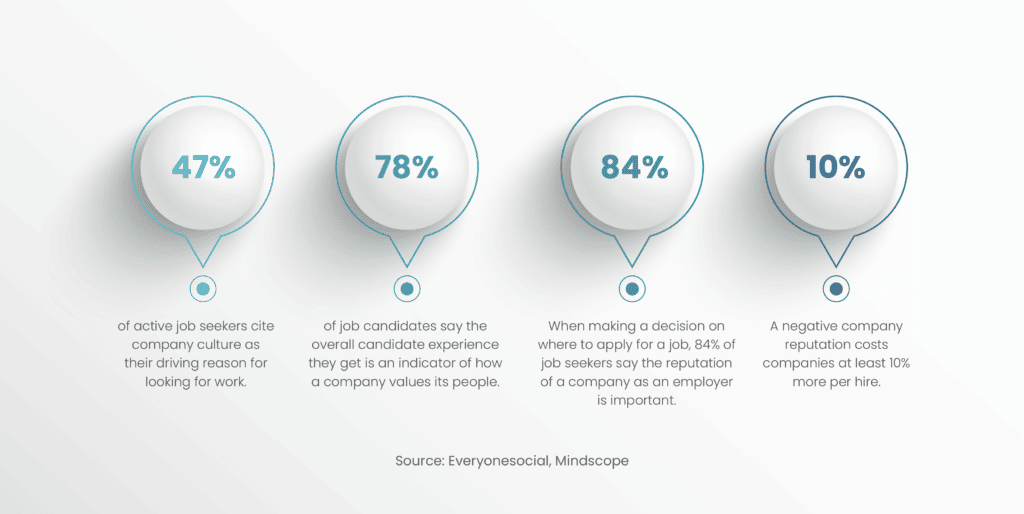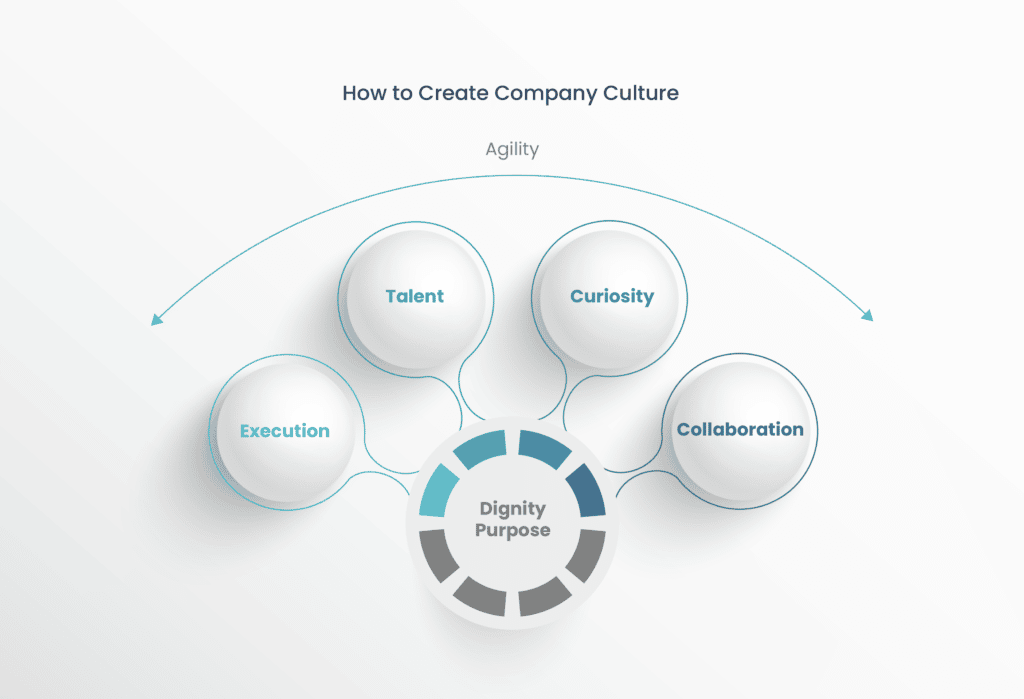Buzzword or key part to a company’s success? Company culture might just be both. The why and how of crafting and implementing a company’s culture may be a somewhat nebulous concept. It’s the intangible, unwritten practices that drive employee behavior throughout the entire organization.
Employee engagement, collaboration, agility and the collective striving for success within the company all hinge on a company’s culture. The many benefits of a healthy and widely adopted workplace culture have a positive impact on an organization’s results from top to bottom.
Contents
Company Culture Definition
Company culture is defined as a set of
shared values, goals, attitudes and practices
that characterizes an organization.
Source: BuiltIn
Even before the pandemic, a Glassdoor survey showed that 77% of respondents said they consider company culture before applying for a job and 56% stated that company culture is more important than salary when it comes to job satisfaction.
Having a compelling mission, culture and values are critical
when it comes to attracting and retaining top talent
in a competitive job market — it is what differentiates each and every employer.
Source: Christian Sutherland-Wong, Glassdoor President
According to Glassdoor data and its MIT Sloan Management Review analysis, company culture is not only key to attracting and retaining top talent, a toxic company culture is the number one reason for employees to quit a job.
For business leaders, this is a clear call to action to create, boost, transform or cultivate company culture as the shared ethos of their organization.
There is no one-size-fits-all approach to workplace culture as every organization is different, but what creates a strong company culture is one that is unanimously accepted from the C-suite to the interns and promotes respect, employee health, teamwork and curiosity Within a strong company culture, employees understand the expected outcomes and behaviors and act accordingly.
What are the Benefits of Company Culture?
A strong company culture confirms to current as well as potential employees that a company has understood the importance of their people. Employees are much more likely to enjoy work and be more productive when their needs and values are consistent with that of their company.

Source: Everyonesocial, Mindscope
Organizations that have built a strong company culture are putting emphasis on providing a balance between employees’ needs and company goals. This increases performance, productivity, and overall results in a work environment that values, engages and protects employees.
Company culture is also important to employers. With a workforce that fits in with the company culture, higher productivity and reduced turnaround create better results.
- Increased employee engagement
- Decreased turnover
- Improved recruitment success
- Higher productivity
- Better results
Dedicating the time and resources to create an organizational culture that’s true to who your team is and where you’re headed will attract the best people for the job and propel your organization in the right direction.
How to Create Company Culture

Which Factors Influence and Shape Company Culture? The culture in an organization always develops, whether intentionally and guided or organically and without clear direction. Altering the direction of an existing culture takes a lot of work and being aware of this, organizations should make their culture a priority from the start. The following areas are key pillars that need to be defined and communicated to shape the culture of an organization.
Key Aspects of Company Culture
Prioritize and celebrate diversity and inclusion. From the boardroom to the interns. All employees should be made to feel valued, respected and important.
Put passion into the work you do. Hiring people who love what the company does creates a positive trajectory. Passion is part of what creates a positive and motivating company culture, encouraging employees to engage, team up and perform at peak levels.
Offer professional development opportunities. Providing opportunities to develop skills and build strengths signals to job seekers that your company culture not only values its people, but believes and invests in them.
Be transparent to establish trust. Feeling left out is never good, especially for the most valuable asset a company has, the employee. Communicate all topics that directly impact them at the earliest opportunity to foster transparency and avoid a sense of distrust.
Values opinions through open communication. A culture of open communication welcomes opinions, questions as well as concerns and encourages employees to speak up. In turn, this gives the leadership team the opportunity to react to concerns and value input.
Establish and apply core values. Top talent will research your company before applying, to see if you practice what you preach. When implemented well a company’s identified key values sit at the core of company culture.
Live your company culture. From attitudes to initiatives, ensure it aligns with and fosters your organization’s company culture. Setting an example and aligning practices with expectations shows employees that their leaders lead by example every day.
Key Search Believes In the Value of Company Culture
As an executive search firm, Key Search digs deep into our client’s company culture not only to best position the company and the role to prospective candidates, but encourages our clients to look deeply at how each candidate will make an impact on the existing culture.
We’re happy to help our clients put their culture on the frontline of their search. To get started, let’s have an introductory chat to see how we can support you.
